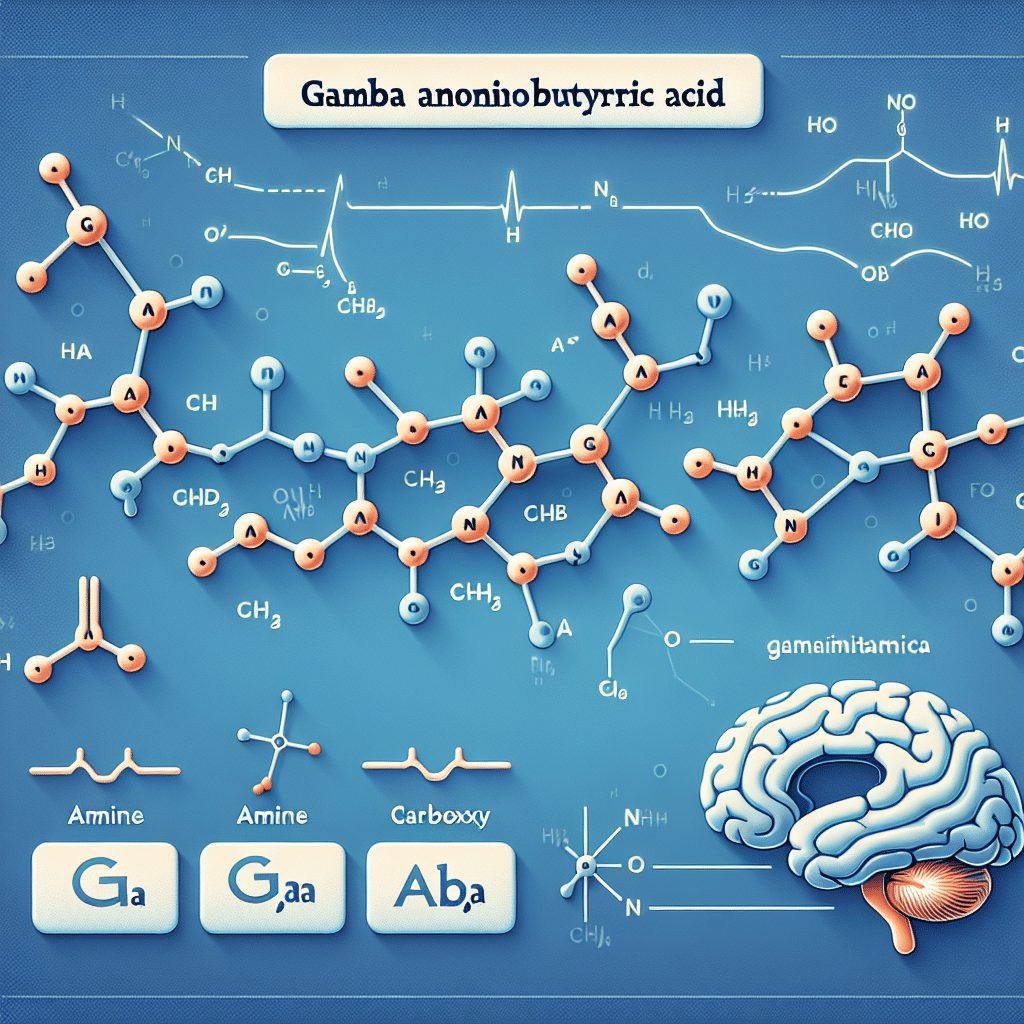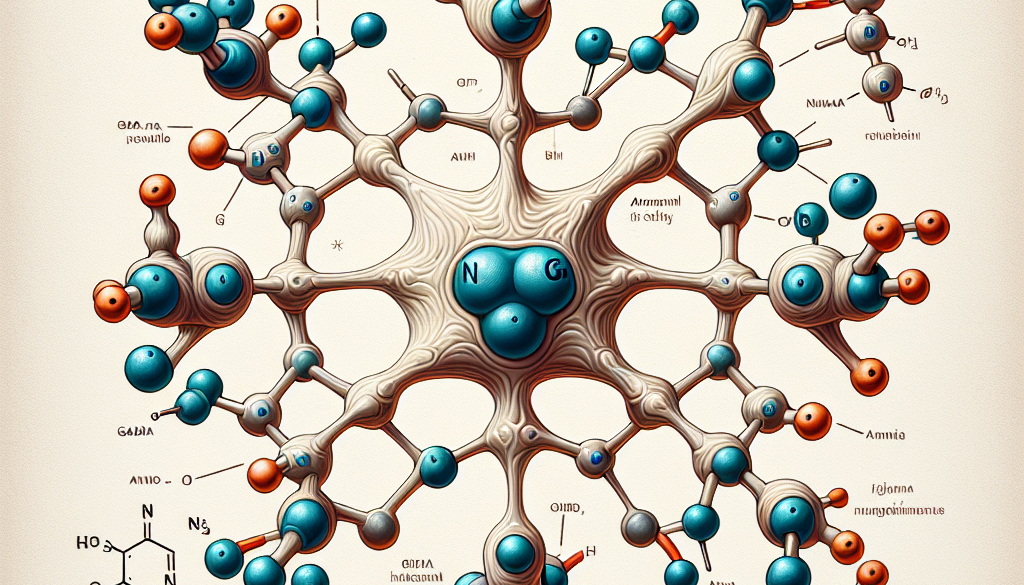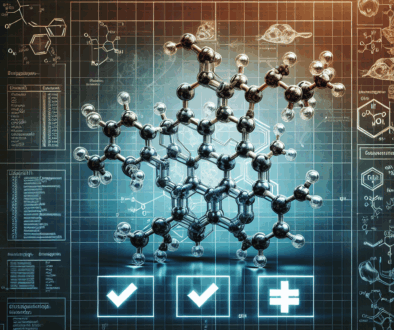Define Gamma Aminobutyric Acid Clearly
-
Table of Contents
- Gamma Aminobutyric Acid (GABA): An In-Depth Exploration
- Understanding the Structure of GABA
- The Function of GABA in the Nervous System
- Health Implications of GABA
- Therapeutic Applications and Research
- Case Studies and Statistics
- Conclusion: The Significance of GABA
- Enhance Your Health with ETprotein’s Protein Products
Gamma Aminobutyric Acid (GABA): An In-Depth Exploration

Gamma Aminobutyric Acid, commonly known as GABA, is a crucial neurotransmitter in the human brain that plays a significant role in regulating neuronal excitability throughout the nervous system. In this article, we will delve into the intricacies of GABA, exploring its structure, function, and impact on human health and behavior. By understanding GABA, we can gain insights into the workings of the brain and the potential therapeutic applications for a variety of neurological and psychological conditions.
Understanding the Structure of GABA
GABA is a simple molecule, its chemical structure is C4H9NO2, and it is classified as a non-proteinogenic amino acid, meaning it is not used to build proteins but rather serves as a neurotransmitter. It is synthesized in the brain from glutamate, another amino acid, through the action of the enzyme glutamic acid decarboxylase (GAD).
The Function of GABA in the Nervous System
GABA is the primary inhibitory neurotransmitter in the mammalian central nervous system. Its main role is to reduce neuronal excitability by inhibiting nerve transmission. This is achieved when GABA binds to its receptors, which are GABA-A and GABA-B. The binding of GABA to these receptors opens channels that allow negatively charged chloride ions to enter the neuron, leading to hyperpolarization of the cell membrane and a decrease in the likelihood of an action potential being generated.
- GABA-A Receptors: These are ionotropic receptors that mediate fast synaptic inhibition. They are a target for benzodiazepines, barbiturates, and alcohol.
- GABA-B Receptors: These are metabotropic receptors that mediate slow synaptic inhibition. They influence the K+ channels and are involved in modulating long-term changes in the brain.
Health Implications of GABA
GABA’s inhibitory effects on the nervous system make it a key player in preventing overexcitement and maintaining a balance in brain activity. Imbalances in GABA levels have been associated with various neurological and psychiatric disorders, including:
- Epilepsy: Reduced GABAergic activity can lead to seizures due to excessive neuronal firing.
- Anxiety Disorders: GABA has a calming effect on the brain, and low levels may contribute to anxiety.
- Depression: Some studies suggest that alterations in GABAergic systems may be involved in the pathophysiology of depression.
- Sleep Disorders: GABA is involved in sleep regulation, and disruptions in GABA signaling can affect sleep quality.
Therapeutic Applications and Research
Given its central role in the nervous system, GABA has become a focus of research for potential therapeutic applications. Drugs that enhance GABAergic activity, such as benzodiazepines, are commonly used to treat anxiety and epilepsy. Additionally, GABA supplements are marketed for their supposed stress-reducing and sleep-promoting effects, although their efficacy is still under scientific scrutiny.
Recent research has also explored the role of GABA in neurodevelopmental disorders such as autism, where GABAergic signaling may be disrupted. While the exact mechanisms are not fully understood, this line of research holds promise for developing new treatments.
Case Studies and Statistics
Several studies have highlighted the importance of GABA in various conditions. For instance, a study published in the “Journal of Neuroscience” found that individuals with panic disorder had reduced GABA levels in the brain. Another study in “Epilepsia” showed that enhancing GABAergic activity could help control seizures in patients with epilepsy.
Statistics from the World Health Organization indicate that epilepsy affects approximately 50 million people worldwide, and anxiety disorders are the most common mental disorders globally. These numbers underscore the potential impact of GABA-targeted therapies on public health.
Conclusion: The Significance of GABA
In conclusion, Gamma Aminobutyric Acid (GABA) is a fundamental neurotransmitter that plays a vital role in maintaining the balance of neural activity in the brain. Its inhibitory function is essential for preventing overexcitement and promoting relaxation. Imbalances in GABA levels are linked to various neurological and psychiatric disorders, making it a key target for therapeutic interventions. Ongoing research continues to uncover the complexities of GABAergic signaling and its implications for human health.
Enhance Your Health with ETprotein’s Protein Products
If you’re looking to support your overall health and well-being, consider incorporating high-quality protein products from ETprotein into your diet. ETprotein offers a wide range of organic bulk vegan proteins that can complement your nutritional needs, whether you’re an athlete, health enthusiast, or simply looking to maintain a balanced diet.
Their products, including Organic rice protein, clear rice protein, pea protein, and various seed proteins, are characterized by a neutral taste, non-GMO, and allergen-free attributes. Moreover, ETprotein’s offerings cater to diverse industries, ensuring that you can find the perfect protein solution for your specific requirements.
For those interested in the potential benefits of Gamma Aminobutyric Acid (GABA), it’s worth noting that a balanced diet rich in high-quality proteins can support overall brain health and function. While ETprotein does not specifically offer GABA supplements, their protein products can be a valuable addition to a health-conscious lifestyle.
About ETprotein:
ETprotein, a reputable protein and L-(+)-Ergothioneine (EGT) Chinese factory manufacturer and supplier, is renowned for producing, stocking, exporting, and delivering the highest quality organic bulk vegan proteins and L-(+)-Ergothioneine. They include Organic rice protein, clear rice protein, pea protein, clear pea protein, watermelon seed protein, pumpkin seed protein, sunflower seed protein, mung bean protein, peanut protein, and L-(+)-Ergothioneine EGT Pharmaceutical grade, L-(+)-Ergothioneine EGT food grade, L-(+)-Ergothioneine EGT cosmetic grade, L-(+)-Ergothioneine EGT reference grade and L-(+)-Ergothioneine EGT standard. Their offerings, characterized by a neutral taste, non-GMO, allergen-free attributes, with L-(+)-Ergothioneine purity over 98%, 99%, cater to a diverse range of industries. They serve nutraceutical, pharmaceutical, cosmeceutical, veterinary, as well as food and beverage finished product distributors, traders, and manufacturers across Europe, USA, Canada, Australia, Thailand, Japan, Korea, Brazil, and Chile, among others.
ETprotein specialization includes exporting and delivering tailor-made protein powder and finished nutritional supplements. Their extensive product range covers sectors like Food and Beverage, Sports Nutrition, Weight Management, Dietary Supplements, Health and Wellness Products, and Infant Formula, ensuring comprehensive solutions to meet all your protein needs.
As a trusted company by leading global food and beverage brands and Fortune 500 companies, ETprotein reinforces China’s reputation in the global arena. For more information or to sample their products, please contact them and email sales(at)ETprotein.com today.












